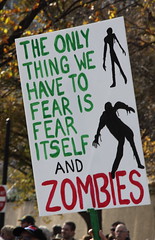Can science fiction be a form of social activism? Walidah Imarisha thinks so, and she's recruited everyone from LeVar Burton to Mumia Abu-Jamal to help her prove it.Read the whole thing. I’m surprised Hudson even felt the need to ask the question. Of course SF—and every other form of fiction—can cause social change. Authors incorporate propositions into their narratives, and when audiences engage with stories, sometimes they come away more than just entertained. To claim otherwise is to deny the power of an art form that has existed for millennia. A better question to ask, I suspect, is to what extent authors should wear their convictions on their sleeves. As the recent hullaballoo over the Hugos has proven, ideological tensions have stretched the field nigh to breaking. I understand the idea of market segmentation, of appealing to the parts of an audience with which you share common ground. But I also suspect that the subtitle alone of Octavia's Brood is enough to disenchant plenty of potential readers. For civility’s sake, perhaps science fiction scribes ought to emphasize the fundamentals. Focusing on storytelling skill, universal human experience, and readerly enjoyment carried the greats; I bet they’d do the same for authors today.
"Whenever we try to envision a world without war, without violence, without prisons, without capitalism, we are engaging in an exercise of speculative fiction," writes Imarisha in Octavia's Brood: Science Fiction Stories from Social Justice Movements, an anthology of short sci-fi stories co-edited by her and Adrienne Maree Brown. "Organizers and activists dedicate their lives to creating and envisioning another world, or many other worlds, so what better venue for organizers to explore their work than through writing science fiction stories?"
(Picture: CC 2010 by colin)



4 comments:
What's the "recent hullaballoo over the Hugos"?
Here's how I best understand it, but keep in mind that clarity is the first casualty in controversies.
Some years ago, an LDS libertarian author named Larry Correia got nominated for the Campbell Award. He became convinced that it was due to a whisper campaign started by a controlling group of progressives who liked to talk a lot about inclusiveness while excluding right-leaning writers. He was told that he was wrong. So he set out to get a slate of writers he liked (and who happened to not be beholden to progressive politics) on the Hugo ballot. The Hugos allow anyone to vote who pays a nominal fee. He didn't have much success the first two years, but this year his suggestions swept the nominations. This has caused many prominent SF writers to say that he's hijacking the awards, and some have suggested that money should be put up to garner "no award" votes for the various categories. Also, people connected with the effort have been called racist, homophobic, etc. Correia maintains that such a reaction simply proves him right. Authors connected with Correia include Brad Torgersen, Mike Reznick, and Sarah Hoyt. Authors unhappy with his efforts include George R.R. Martin, John Scalzi, and Mary Robinette Kowal.
I've tried to be as even-handed as possible with the summary, but the whole thing is a mess right now -- as every controversy inevitably becomes.
Blech.
Yes, controversy is rarely fun.
Post a Comment